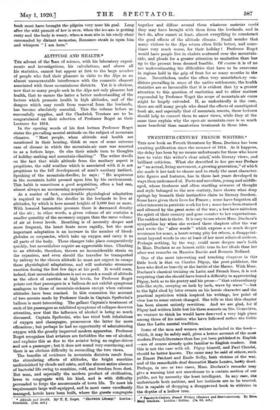ALTITUDE AND HEALTH: *
Tan advent of the ?nen of science, with his laboratory experi- ments and investigations, his calculations, and above all his statistics, cannot but appear at first to the large number of people who find their pleasure in visits to the Alps as an almost unwarrantable interference with the romantic element associated with those mountainous districts. Yet it is obvious, now that so many people seek in the Alps not only pleasure but health, that to ensure the latter a better understanding of the factors which promote health in high altitudes, and of the dangers which may result from removal from the lowlands, has become absolutely essential. This the volume before us successfully supplies, and the Chadwick Trustees are to be congratulated on their selection of Professor Rogot as their Lecturer for 1914.
In the opening words of his first lecture Professor Roget states the prevailing mental attitude on the subject of mountain climates. "Most people, when altitude and health are mentioned in their hearing, think at once of some extreme case of disease in which the mountain-air cure was resorted to as a forlorn hope. Or else their minds turn to thoughts of holiday-making and mountain-climbing." The writer dwells on the fact that while altitude from the sanitary aspect is propitious, the cold weather which is associated with it is not propitious to the full development of man's sanitary instinct. Speaking of the Mountain-dweller, he says : "He acquiesces in the mountain habit pressed upon him by environment. This habit is sometimes a good acquisition, Often a bad one, almost always an unreasoning acquiescence."
As a matter of fact, considerable physiological adaptation is required to enable the dweller in the lowlands to live at altitudes, by which is here meant heights of 5,000 feet or more. With lowered barometric pressure 'there is decreased density of the air ; in other words, a given volume of air contains a smaller quantity of the necessary oxygen than the same volume of air at lower levels. Breathing is of necessity deeper and more frequent, the heart beats more rapidly, but the most important adaptation is an increase in the number of blood. globules or corpuscles, which take up oxygen and carry it to all parts of the body. These changes take place comparatively quickly, but nevertheless require an appreciable time. Climbing to an altitude, therefore, throws no inconsiderable strain on the organism, and even should the traveller be transported by railway to the chosen altitude he must not expect to escape these physiological adaptations, and will undertake strenuous exertion during the first few days at his peril. It would seem, Indeed, that mountain-sickness is not so much a result of altitude as the effect of exertion at high levels, for Professor Roget points out that passengers in a balloon do not exhibit symptoms analogous to those of mountain-sickness except when extreme altitudes have been reached. In this connexion the account of two ascents made by Professor Gaule in Captain Spelterini's balloon is most interesting. The gallant Captain's treatment of such of his passengers as exhibited symptoms of collapse deserves attention, now that the influence of alcohol is being so much discussed. Captain Spelterini, who has tried both inhalations of oxygen and champagne, pronounces the latter far more efficacious ; but perhaps he had no opportunity of administering oxygen with the greatly improved modern apparatus. Professor Roget recognizes that aviators are forbidden the use of alcohol, and explains this as due to the aviator being an engine-driver and not a passenger ; but it does not sound very convincing, and -there is an obvious difficulty in reconciling the two views.
The benefits of residence in mountain districts result from the stimulating effects of altitudes, the bright sunshine undiminished by clouds and mists, and the almost entire absence of bacterial life owing to sunshine, cold, and freedom from dust. But Man, and especially the modem product of civilization, loves to congregate with his kind, and is with difficulty persuaded to forgo the amusements of town life. To meet his 'requirements large well-equipped, and in most cases excellently managed, hotels have 'been built, where the guests congregate
• Altitude and IfeaRh. ree IP. e. Roget. " Chadwick Idbraty." London : Constable. [12s. net.] together and diffuse around them whatever materies morbi they may have brought with them .from the lowlands, and in fact do, after sunset at least, almost everything to counteract the good effects of the altitude climate. Small wonder that many visitors to the Alps return often little better, and some- times very much worse, for their holiday ! Professor Roget would have people live in chalets scattered over the mountain- side, and pleads for a greater attention to sanitation than has up to the present been deemed feasible. Of course it is of no use underestimating the difficulties that have to be overcome in regions held in the grip of frost for so many months in the year. Nevertheless, under the often very unsatisfactory con- ditions prevailing in some of the native settlements, the health statistics are so favourable that it is evident that by a greater attention to this question of sanitation and to other matters expounded by Professor Roget the scope of mountain-air cures might be largely extended. If, as undoubtedly is the case, there are still many people who dread the effects of unmitigated fresh air, and especially that of mountain resorts, these lectures should help to convert them to saner views, while they at the same time explain why the open-air mountain-cure is so much more beneficial than sanatorium treatment in these isles.


































 Previous page
Previous page